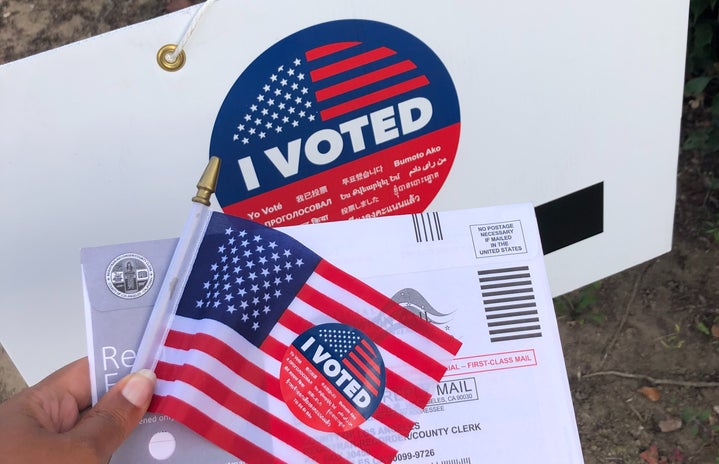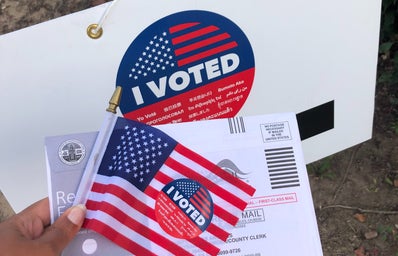I can vividly remember my sixteenth birthday; it was the year I finally felt a modicum closer to adulthood. I could finally get my own driver’s license, which I had been itching to do after years of being driven around Los Angeles by my parents, and it was the first year I could pre-register to vote in U.S. elections. I remember imagining my first time voting and the excitement that came along with confidently driving myself to the polls and casting my first vote in an old-fashioned ballot box.
In reality, the first year I was eligible to vote in my home state of California, my life had taken an unexpected turn and I had accepted an offer at a four-year college abroad and left not only California but the entire country. For the next four years, I would be living overseas in the tiny Scottish town of St Andrews with its cold, dark ocean and wind-swept, rainy days. When I moved to St Andrews, gone was the opportunity to vote in person, as well as the chance to walk down the streets of Los Angeles donned in an I Voted sticker alongside the masses of people who had voted that day. I realized that I would have to carefully keep track of voter registration deadlines myself and make sure I sent in my ballot in time.
By the time February of this year rolled around and I realized the Presidential Primary Election was only a month away, I found myself hurriedly registering to vote online for the upcoming election When I received the familiar envelope with my ballot enclosed in my dorm mailbox, I knew that I would be faced with the somewhat daunting task of researching each candidate online, bubbling in my choices, and going to the post office to ensure my ballot was sent out in time. My American friends also expressed anxious sentiments about voting, as the deadlines for our state had quickly encroached upon us amidst accumulating essay deadlines and a long-awaited reading week in which we would travel together. I forgot to send out my ballot before leaving Scotland for reading week and I ended up sending my ballot out on election day itself. As a result, my ballot unfortunately arrived a couple of days after March 12th, the final day it could be counted. I felt disheartened and frustrated at myself for not sending it out sooner and promised myself I would mail my ballot well in advance in the future.
With the Presidential Election right around the corner in November, it is important that every U.S. citizen living in St Andrews casts their ballot on time. Although voting abroad can feel daunting, voting by mail has been made as convenient and simple as possible. Here are several easy tips and tricks that can guide you through the process after you have registered to vote.
Before I begin, this article is not meant to function as a how-to guide on all things voting or a guide specifically catered to the November election ballot, although it will provide you helpful tips and tricks for ensuring you vote in time. Similarly, the rules surrounding voting ultimately differ state by state and as a result, it is essential you check your state’s official government website for all voting information and ensure you are made aware of your state’s voting registration deadline.
- Remember to Register to Vote by The Deadline!
If you are a first time voter or have voted in previous elections and are unsure if you are still registered to vote, you can check your voter registration status any time online. You can find a list on the Federal Voting Assistance’s website containing each state’s voter registration information. It is essential you know your voting status well before the election and that you are aware of your state’s voter registration deadline. For example, in California, “the deadline to register to vote for any election is 15 days before Election Day.” Make sure that in early fall you are aware of your voting status, you have updated your address if need be, and if you are a first time voter, simply visit your state’s website and register before the deadline. After you register, your ballot will be on its way shortly and in the meantime, you can check your voter registration status, track your ballot’s arrival, and start researching candidates.
- Tips for Keeping up to Date on U.S. Politics and Researching Candidates
Okay, you have received your ballot. Now begins the research.
If you are someone who is looking for easy and reliable ways to keep up to date on politics, I recommend following your favorite news sources verified accounts on social media. I follow The New York Times, The Washington Post, The Guardian, The Atlantic, and a handful of politicians on social media; these accounts are all labeled as some of the most shown accounts on my feed and help me to engage with politics on a day to day basis. I constantly find myself prompted by news article links shown to me on social media and researching topics in depth online that pique my interest.
I also recommend getting subscriptions to some of your favorite news sources or finding a family member or friend who has subscriptions you can use. This way you have more articles available, as many of them are not free, and you can track political ongoings. One of my relatives has a subscription to The New York Times and being able to access their wide variety of news has helped me keep up to date with issues all around the world.
Similarly, when you research any issue that is important to you or candidates on any ballot, you can visit their campaigning websites to see what issues are most important to them, as well as what organizations support them. I think gleaning what organizations support what candidates and vice versa is a great way to highlight the best candidates. For example, reproductive health rights are an important issue to me and seeing a candidate endorsed by Planned Parenthood alongside advocating for reproductive rights in their campaign helps ensure the legitimacy of that value to me. You can also look at voter guides to help you discern which candidates are best for regional and smaller elections (although this is obviously more relevant to the presidential primaries election that just took place in March).
- Mail Your Mail-in-Ballot Well in Advance
Mail your ballot as early as possible to ensure your ballot makes it back to your state in time and is counted. Don’t make the same mistake I did! One of the ways to hold yourself accountable is to track your ballot’s arrival via mail. As a student living in a dorm, I do not receive a lot of letters so I don’t check my mailbox on the daily; however, if you know the exact day it arrives, you can collect it from your mailbox, set a reminder in your calendar to fill out, and then mail it out in advance. According to the U.S. Embassy & Consulates in the United Kingdom, “Mail sent using the diplomatic pouch must go to a U.S. sorting office before it can be sent on to the relevant election officials using the U.S. postal system. You would need to place your ballot in either a postage paid envelope or an envelope addressed to your state’s election officials with U.S. stamps sufficient for delivery once your ballot arrives in the United States. The estimated time from dropping off the ballot to it entering the U.S. postal system is seven to ten days.”
- Track your Ballot
After you vote, you can track your ballot’s location online. You can also pay at the post office in St Andrews to give you tracking information as well. Once it makes it to the U.S., your work is done!
It is incredibly important that all Americans living abroad in the UK ensure that they vote in the upcoming U.S. Presidential election. There are a lot of key issues at stake, and it is important that young voters show up and demonstrate the importance of these issues in order to protect our future.


